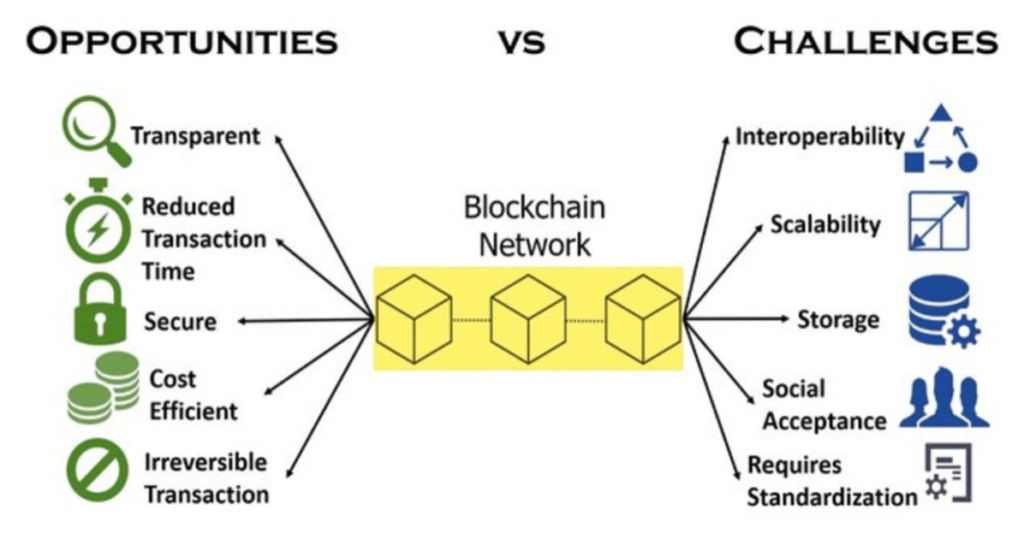As the blockchain ecosystem grows and new use cases come up, businesses in all fields have to deal with a wide range of problems that can be hard to solve and may be controversial. Simply put, what are the real challenges to blockchain adoption? Can it triumph over everything and emerge as a technological boon?
Blockchain continues to be the most talked-about topic in the IT industry. The reality is that there is always a period of hype surrounding a new form of technology. It will take a long time to overcome all the obstacles and start using new technology to fuel the modern world. In the case of blockchain, the saying holds true as well. This technology has been the victim of a $14.6 billion theft. Even though there are a lot of alternatives, it will still take a long time to deal with all the issues.
For that reason, this guide will go over some of the fundamental issues with blockchain and how to solve them, so that newcomers to the technology may get a better grasp on it.
Top challenges to blockchain adoption that the world is facing
The greatest challenges to blockchain technology that the world is currently facing are listed below.
1-Poor Capacity to Scale
Scalability is the main issue that must be addressed when putting blockchain technology into wide-scale practice. The truth is that blockchains appear to function for a limited number of participants. But what will happen if integration occurs on a large scale? In terms of network traffic, Ethereum and Bitcoin now have the most users, and they are, unsurprisingly, struggling to keep up.

Due to the fact that there are more people using the network, it takes longer to process transactions. Because of this, the fees for making a transaction are higher than usual. This makes it harder for people to use the network.
The entire transaction could take several days to complete. This difficulty in widespread blockchain deployment reduces the value of the underlying technology.
While some blockchain solutions did demonstrate improved speed, most slowed down as more people joined the network.
As a result, this problem must be resolved quickly or the entire technological landscape will become boring.
Read more: Interesting facts about blockchain technology
2- Failure to be standardized

What kind of standards does blockchain now follow? There isn’t a universally accepted network protocol despite the abundance of options.
There is a stovepiped approach to the standardization issue. For the simple reason that businesses are building their own blockchains and blockchain-based applications. So, in each business, many chains are being put together by different groups based on different criteria. This can be less efficient than current methods and goes against the spirit of distributed ledgers.
Because there isn’t a single standard, there are problems with connectivity, costs go up, and procedures get harder. No specific version of blockchain technology exists, which discourages new developers and investors.
3- Lack of security and proof of identity
One major challenge of blockchain technology is that it doesn’t have proof of stake or proof of identity. In this design, people’s identities aren’t known, and cryptocurrency transactions are more tied to wallets than to people.
The disagreement here is that many smart contracts and transactions don’t need to be shared on the ledger. Instead, they only need to be shared with a few known identities. So, this system raises questions about security and privacy.
Although no technology is 100% secure, supporters of blockchain point out that no one has been able to crack its encryption or compromise its decentralized design. A blockchain-generated identity would be one-of-a-kind and provide more solid proof that a person is who they say they are. However, these assurances don’t negate the fact that every company that adopts this technology should think about how privacy and security can influence its architecture.
The arguments of blockchain supporters cannot hold water in the face of the loss of $14.6 billion in value across 364 incidents.
Unfortunately for DeFi, several of the freshly released protocols have flaws in their coding that can be exploited by malicious actors. These code flaws were used in 21% of all hacks in 2021.
Kim Grauer, Chainalysis’ head of research
4-Efficiency and cost issues
In order to make peer-to-peer transactions fast and cheap, blockchain networks have to pay a big price, which is higher for some types of blockchain than for others.
- Since Bitcoin and other cryptocurrencies employ a proof-of-work system rather than trusting one another on the network, there are substantial continuing costs involved with validating and distributing transactions on the public ledger. The annual cost could exceed $600 million and is expected to keep climbing.
- Each node wastes time processing the same information twice because it wants to be the first to find a solution. This increases cost too.
- Once a certain ‘critical mass’ of nodes is achieved, the process dramatically increases output. However, there are some network nodes that may not have much of an effect, no matter how hard they work. That’s why it’s so crucial to give blockchain applications plenty of thought before committing to one.
- As the size of the network increases, the return for individual processing nodes decreases. Therefore, in order to benefit end users or entire industries, blockchain applications will need to leverage network effects.
5-Lack of Sufficient Skill Sets

Just as important as getting the right software and hardware is finding people who know how to manage blockchain technology. You are probably aware that blockchain technology is still in its infancy and developing rapidly. Few people nowadays possess the knowledge necessary to maintain such sophisticated technology.
However, there is a significant need for this level of skilled labor. If you’re looking to fill positions with qualified candidates, be prepared to shell out some serious dough. Finding the proper individuals will cost you.
The blockchain, like any other technological advancement, will inevitably undergo further refinement. There may be difficulties, but they shouldn’t be seen as impassable. There must be a shift to new rules and norms. It won’t be long before you’re thinking about how blockchain could benefit your business. Understand that there will be obstacles to implementing blockchain technology.
6-Lack of awareness and understanding
The lack of awareness and understanding about blockchain technology is another major obstacle. The truth is that most people still don’t know this technology exists or how it could benefit them. Achieving widespread adoption is crucial for blockchain’s long-term viability. Unfortunately, the groundbreaking nature of this technology isn’t enough to win over more buyers at this time.
Inadequate marketing efforts have also contributed to this niche’s unpopularity. Consequently, you will be completely unaware of its existence unless you take part in it.
At the moment, the terms “blockchain technology” and “Bitcoin” are almost interchangeable. People generally believe only Bitcoin exists on the blockchain. Others are completely unaware of it, except for the cryptocurrency aspect.
Additionally, Bitcoin’s value has reached new heights. In addition, bitcoin is still linked to illegal activities like money laundering, black market commerce, and more.
Before bitcoin and other cryptocurrencies and blockchain technology are widely accepted, the general public needs to learn more about them. This will assist in removing cryptocurrencies’ potentially negative connotations, allowing the technology to stand on its own. As a result, more people will be open to trying out new technology.
Challenges to Blockchain adoption: Is There No Way Out?
Although it could appear that blockchain only has issues, it has been providing many benefits. For example, Hyperledger provides a wide range of projects tailored exclusively for commercial businesses. Also, Ethereum is making permissioned systems that can solve most of the problems that businesses have with blockchain.
Furthermore, a permissioned blockchain can be advantageous for many different businesses. In fact, there are numerous operational applications and projects that are operating well. As you can see, there are chances and answers for any issue using blockchain.
Moreover, a lot of businesses are investing a lot of money in this technology since they are anxious to adopt or apply it. So, it’s just a matter of time before society and the economy change in a big way with this technology.









Leave a Comment